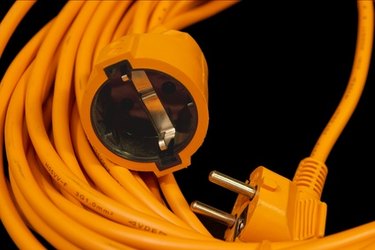
Many people use wide-gauge extension cords around the house. These cords can be used for many things, such as powering an electric lawnmower or drill, extending an electrical outlet to a desk or lamp, or allowing more options in the placement of electronics. However, these cables are not foolproof, and a level of caution should be exercised around them.
Extension Cord Styles
Video of the Day
Most extension cords use a three-pronged connection. This connection is safer than a two-pronged connection because it contains a third pin that acts as a grounding connector. This means that the cable is less likely to short out, and if it does, it is less likely to start a fire or damage the equipment that is plugged into it. Two-pronged cords are not as safe, and should only be used with low-wattage household equipment, such as table lamps.
Video of the Day
Construction
The construction of an extension cord is simple. A plastic covering is on the outside, visible part of the cord. This shield is intended to protect the inside of the cable from damage and the weather, while helping to insulate the wire. Below this layer is the insulation, which is normally made of thick, special plastic. This holds in the heat generated by the cable, making the cord safer. The wire, which is usually made of copper, is inside of the insulation. It conducts the electricity.
Heat Production
Electricity produces warmth when it is conducted through a material. The insulation layer on the wire helps to keep this heat in, which makes the cable more efficient and helps keep it from heating up and damaging the objects around it (or causing a fire).
Causes of Warmth
If you can feel the warmth on your extension cord, something is wrong. Overloading the cable with more items than it can handle may cause a hot extension cord. However, this problem can also be caused by poor or worn-out insulation. This situation is dangerous because it may result in a short or a burn to the items surrounding the cable (or to you). Unplug the cable immediately and discard it. A damaged cord is not worth repairing and the cable cannot be safely used with damaged insulation. However, placing a cable in the sun or underneath a blanket may also cause it to become warm. These situations are harmless and nothing needs to be done about them.